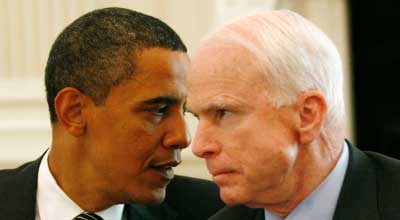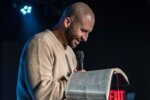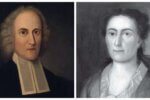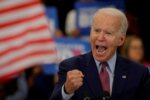The 2008 presidential election has been more contentious than any in recent history—especially for evangelical Christians.
When Stephen Mansfield started writing his book The Faith of Barack Obama, the Illinois senator was a long-shot presidential hopeful whose religious background was of little interest to most. One year later, Obama is the Democratic nominee for president, and his faith is a popular topic. In fact, national media outlets such as Newsweek began calling Mansfield long before his book released in August.
“I didn’t know this was going to end up being the only book on Obama’s faith in an election about faith,” Mansfield says. “I’m not smart enough to figure that out.”
Although the presidential election of 2008 has been a race about plenty of other things—the war in Iraq, the economy, rising gas prices—it has been one with a particularly strong emphasis on faith, from Obama’s association with the controversial Rev. Jeremiah Wright to Sen. John McCain’s embrace and then rejection of charismatic pastors John Hagee and Rod Parsley.
And with the Democratic candidate being, ironically, more candid about his religious beliefs than the presumptive Republican nominee, Christian voters are more divided this election season than at any time in recent history. Some observers say the election signals a changing of the evangelical guard; others believe Christians’ political priorities are shifting. Whatever the case, the 2008 race for the presidency is proving that conservative Christian voters are not a monolith and that faith remains a critical factor in shaping U.S. politics.
Putting Faith Front and Center
Despite the aggressive press coverage of the candidates and their backgrounds, questions about the faith of both men persist. In April, one in 10 American adults believed Obama to be a Muslim despite the senator’s frequent denials of the claim and his relative ease in discussing his Christian faith. That perception has been shaped by e-mails that said Obama attended a radical Islamic madras in Indonesia and that he was sworn into the U.S. Senate with his hand on the Quran.
And then there are the divisive sermons that Wright, Obama’s longtime friend and pastor, preached from the pulpit of Trinity United Church of Christ in Chicago. When some of Wright’s sermons appeared on YouTube, many wondered if Obama shared his pastor’s radical views.
Mansfield, a former pastor who penned The Faith of George W. Bush in 2003, has visited Trinity, which Obama attended for 20 years before resigning his membership in the wake of the Wright scandal. Far from an Obama apologist, Mansfield found that the “gospel was preached” at Trinity but so was “liberation theology”—a complex belief system that sees the biblical narrative through the eyes of the oppressed.
“Wright, for example, would be stridently supportive of the Palestinians, not because he hates Jewish people but because he believes in standing with the oppressed,” Mansfield says.
That view flies in the face of comments Obama has made in support of Israel. Wright has also said the U.S. invited the 9/11 attacks by participating in terrorism of its own, which included using nuclear weapons against Japan during World War II. Obama has repudiated this view, as well which begs the question: Why would Obama have attended Wright’s church?
“He initially went because the people he was working with [as a community organizer] in the inner city of Chicago said, ‘You’re not going to make as much progress with these folks unless you make some progress with your faith,’ ” Mansfield says. “He’s very transparent, and he’s said that he initially went there because it would help him with people of faith.”
Through that imperfect church and Obama’s less-than-perfect motives, Obama became—Mansfield says unequivocally—a committed Christian. This despite his having grown up with an atheist mother who was “caught up in the secularism and liberalism of the ’60s” and with “Unitarian Christian” grandparents.
McCain’s faith has been more circumspect than Obama’s—no long-standing ties to pastors with incendiary views about America or Israel, no childhood in a predominantly Muslim country; rather, a diploma from an Episcopal high school in Virginia and membership with a quiet Southern Baptist church in Arizona. Yet McCain has been more hesitant than Obama to discuss his faith in public—something Mansfield attributes largely to a generational difference.
In Faith of My Fathers, McCain writes that his mother, the daughter of an Episcopal minister, saw to his religious instruction. While a prisoner of war in Vietnam, McCain says he prayed regularly and once served as a chaplain for the men under his leadership.
In his 2002 memoir Worth the Fighting For, McCain says his divorce from Carol Shepp—one month before his marriage to Cindy Helmsley in May 1980—was due to his “selfishness and immaturity.” He told Beliefnet in 2005 that past mistakes have made him “a much bigger believer in redemption.” He says, “I’m much more of a believer in a loving God, a personal God. I’m much less inclined in every way to believe in a vengeful God.”
Despite his longtime association with conservative Baptists, McCain has had more high-profile scrapes with evangelicals than his Democratic rival. Earlier this year Focus on the Family chairman James Dobson said he may not vote in 2008 because he was dissatisfied with the candidates. Dobson has criticized McCain for having “a legendary temper” and often using obscene language—which some critics see as a sign of uncontrolled anger.
Dobson announced his support for the Republican candidate only after McCain chose Alaska Gov. Sarah Palin as his running mate, saying McCain’s selection of the strongly pro-life, outspoken Christian was “a very encouraging sign” for his campaign. (See related article on page 28.)
This isn’t surprising. McCain has had an awkward relationship with evangelicals for years—from his comment in 2000 about the Rev. Jerry Falwell being “an agent of intolerance” to his more recent rejections of endorsements from two megachurch pastors. Hagee, pastor of Cornerstone Church in San Antonio, was accused of making disparaging comments about Catholicism, while Parsley, pastor of World Harvest Church in Columbus, Ohio, had said that Islam was inherently violent—reasons McCain ultimately distanced himself from both men.
Rallying the Conservative Base
Unlike Obama, who hired a Pentecostal minister to help him connect with the faith community, McCain was slow to reach out to Christians this election season. That didn’t stop evangelicals from endorsing him, however tepidly. In early July, more than 90 evangelical leaders, including Charisma publisher Stephen Strang, met in Denver and announced that they were endorsing McCain. One of the participants, Phyllis Schlafly, president of the conservative family advocacy group Eagle Forum, said: “The alternative is so bad we must support John McCain”—not exactly the stuff of pep rallies.
The tenor began to change after pastor Rick Warren hosted both candidates at a civil forum at Saddleback Church. During the event, McCain gave what many evangelical leaders saw as more decisive answers to questions about abortion, gay marriage and evil in the world.
“People were, before, just kind of wringing their hands thinking, what kind of mess do we have here, what kind of choice do we have,” Tony Perkins, president of the conservative Family Research Council, told Politico after the forum. “I think he stopped the … ambivalence that was out there toward John McCain.”
Perkins says the lack of evangelical fervor for McCain was never entirely justified. “While McCain has not always [articulated] solid positions on conservative social issues, he does have a pretty consistent voting record,” he says.
On abortion and gay marriage, McCain has staked out conservative positions. He has said he is in favor of overturning Roe. v. Wade, and he opposes gay marriage, though he voted against the 2004 federal marriage amendment, which would have altered the Constitution and prohibited all same-sex marriages. He believed it was a state issue, not a federal one.
Yet despite his more permissive stance on abortion, Obama is catching people’s ears and drawing ardent supporters. The Rev. Kirbyjon Caldwell—despite his close friendship with the Bush family and his previous support for President George W. Bush—endorsed Obama early this year and at one time was in weekly contact with the Obama camp.
“I still have a great relationship with the Bush family,” says Caldwell, pastor of Houston’s 14,000-member Windsor Village United Methodist Church. “But … our relationship is not built on the foundation of politics or policies.”
Though Caldwell had read Obama’s two books and heard many of his speeches, he didn’t decide to support Obama until meeting him in person at a private reception in Houston in 2007. He was impressed with his moral vision, which Caldwell compares to Methodist leader John Wesley’s concept of “personal piety and social holiness.”
“I think [Obama] personifies the nexus of moral consciousness and social responsibility that we need in America today,” Caldwell says. “It would be a stretch for me to say he’s a 21st century version of John Wesley, but when you look at the options in the public square today, I think he comes the closest.”
Caldwell has occasionally had to defend his support for Obama to other Christians. He recently came under fire for having an outreach to people with unwanted same-sex attraction removed from his church Web site. Although he was accused of cowering to gay activism, Caldwell says he had it removed when the Obama camp called because he hadn’t warned them it existed.
“If I’m going to officially support a candidate, then I’m responsible as well, I think, for vetting myself and letting them know of any potential … intriguing issues which may arise that could help or hurt the campaign,” Caldwell says. “The campaign did not ask me to remove it. I felt so badly that I didn’t tell them up front, I removed it.”
Caldwell says he sees no conflict between his choice for president and his personal convictions on issues such as gay marriage and abortion. Although Obama supports civil unions for gay couples, Caldwell says he has heard him say “on more than one occasion” that he is opposed to same-sex marriage.
Caldwell believes that Obama would not require clergy to perform same-sex unions, and he is convinced Obama would not pass legislation that would prevent pastors from preaching that homosexuality is a sin—a view Caldwell holds.
On the abortion issue, Obama is personally opposed to it, but unlike McCain has never talked about overturning Roe v. Wade and instead has sought ways to reduce the number of abortions. “I am pro-life. Period,” Caldwell says. “But I am pro-life both before birth and after birth. … It’s shameful and sinful to abandon the baby before it’s born, and it’s equally sinful to abandon the baby after birth.”
Caldwell adds: “Obama’s positions and policies are designed to decrease abortions and the need for abortions, and this is where the rubber meets the road. During the administrations of pro-life presidents, you do not see a decrease in abortions, so … why not give [Obama’s] policies a chance?”
A New Kind of Christian Voter
According to Cameron Strang—founder and publisher of Relevant magazine, which targets 20-something Christians—a significant portion of his readership, are, like Caldwell, socially conservative and supporting Obama. “They are pro-life, they are by and large against abortion, but they’re redefining pro-life to include a broader perspective,” Strang says of younger Christians. “They’re looking at the war, or pre-emptive war, as a life issue. They’re looking at the environment as a Christian issue in that Jesus talks about stewardship and Jesus didn’t promote excess and consumption and waste.”
Strang, who was invited to pray at the Democratic National Convention but declined because he didn’t want to appear partisan, says many younger voters are looking at all the issues and saying, “Out of 10 issues, I agree with Obama on maybe nine of them—the only one I agree with McCain on is abortion legislation—but I actually agree with Obama on issues that as a Christian matter to me.’ And then when you have [Obama] actually courting the Christian vote, you see a lot of support right now from younger Christian voters.”
It’s the sort of thing that makes people like Lou Engle, founder of TheCall—a series of large prayer gatherings—scratch his head. Engle is a passionate pro-life activist who sees the abortion issue as the seminal moral evil of the day. “TheCall is not supposed to be political, but when issues such as abortion become a political issue rather than a moral issue, then it is our standing to stand with truth,” Engle says. “God is neither a Democrat or a Republican, but He is righteousness and truth.
“There’s a whole wave or movement going on in evangelical churches that says that abortion is an issue, but it’s one of many issues … and there are many issues. But there are certain issues … of such foundational truth that if you mess with those issues, you incur the discipline of heaven.”
Carrie Gordon Earll, senior director of issue analysis for Focus on the Family, echoes Engle’s sentiments. “When I know that Obama in the White House would work to solidify Roe v. Wade … it would for me be a sin to vote for him,” she says.
Pentecostal minister Sammy Rodriguez Jr., president of the National Hispanic Christian Leadership Conference, says ending abortion and protecting traditional marriage are significant issues to Latino evangelical voters, too.
But he says polls conducted by his organization show McCain winning less than 50 percent of the Hispanic evangelical vote—significantly less than the 68 percent Bush won in 2004.
Rodriguez attributes the reticence to Republicans’ handling of the debate over immigration reform—an issue Rodriguez believes McCain is still deeply committed to despite the fact that he said he would no longer vote for the immigration reform bill he introduced because it doesn’t prioritize securing U.S. borders.
“The Republican National Committee needs to apologize to the Hispanic voter … for not repudiating the xenophobic and nativist rhetoric that infiltrated the entire conversation about immigration reform,” he says.
“[Hispanic evangelicals] like McCain, they don’t trust the party. [They’re asking], Do I vote for a person who I like in a party that doesn’t want us? Or do I vote for a party that wants us but does not believe what we believe in? That’s going to be the choice in 2008.”
He says McCain must step up his outreach to evangelicals—especially Latino Christians. Without at least half the Latino evangelical vote, McCain “might as well write this one off,” Rodriguez says. “All things being even, the Hispanic evangelical vote will be the deal breaker.”
Marc Nuttle is an attorney, conservative political adviser and the author of Moment of Truth. He has no illusions about the changing political landscape in America. Culture warriors such as the Rev. D. James Kennedy and Jerry Falwell have died, and other politically active Christian conservatives such as Christian Broadcasting Network founder Pat Robertson are getting older—all factors that are helping to make this presidential election unpredictable.
Nuttle argues that the conservative movement in America peaked in 2006 and is slowly being replaced by new evangelical coalitions. He says the next generation of evangelical leaders will emphasize fighting poverty and protecting the environment alongside ending abortion and preserving traditional marriage. “The values won’t change, but the priorities will, and you’ll find new organizations that are different from the old-guard Christian right,” he says.
The next battleground, he predicts, will be over how to solve the world’s major problems—through government solutions that lean toward socialism or private initiatives that protect individual freedom. “I think the future will be less driven by Republican and Democratic labels and more by, Do you believe all your answers will be [provided] by the government or do you believe in a higher calling?” he says.
With the presidential candidates holding opposing views about how much government involvement is necessary, Nuttle says voting is critical. “If you don’t vote … you’re basically putting your baby on the door of a stranger,” he says. “It may work out, but why would you take the risk?”
Cameron Conant is a freelance journalist and the author of With or Without You. He lives in Nashville, Tennessee.
ONLINE EXCLLUSIVE: To learn more about where John McCain and Barack Obama stand on key issues including gay marriage, energy policy, the economy and stem-cell research, click here.
John McCain Speaks Out
Charisma publisher Stephen Strang talked with the Republican nominee about faith, morality and America’s future.
Charisma: George W. Bush won support from evangelical Christians partly because of his Christian faith. You seem more private about your faith, although we know you attend church. Describe your faith for us.
McCain: My faith has guided me not only in the events of my life, but it also is a vital part of my decision-making process. I don’t pray for miracles. I do pray that I will be given the guidance and the strength to do the right thing. There are many times when we are tempted to take a path that is politically expedient or that is in our short-term best interest. I think that it’s important to recognize that although we don’t know God’s will, it is certainly appropriate to pray to do what is best—what’s in the best interest of the country, the family, and what would lead to a better and more Judeo-Christian-valued world.
Charisma: Sen. Barack Obama says he wants to continue President Bush’s effort to fund church-based programs that offer social assistance. What is your position on this faith-based initiative?
McCain: I would support it and expand it. But I also think it’s important to point out that Sen. Obama says faith-based organizations must adhere to “federal hiring practices.” That would basically undermine the ability of many, if not all, of these faith-based organizations to function in the way that they have traditionally—and that is, to hire people according to their adherence to their faith and beliefs and principles.
Charisma: Eight years ago you called the religious right, generally, and Jerry Falwell and Pat Robertson, specifically, “agents of intolerance.” Do you still believe that’s a good characterization?
McCain: I was upset at the time because there were some individuals who had run a campaign in South Carolina which was really an assault on my family. So, Rev. Falwell—and I thank God for it—came in my office and said that he wanted reconciliation. That’s been my job through my life, to have reconciliation and work together for the good of this country. I’m proud of the reconciliation that I had with Rev. Falwell and others in the Christian community.
Charisma: America seems very polarized right now. If you are elected president, what will you do to bring the nation together?
McCain: I have a long record of reaching across the aisle and working together with Democrats for the good. I will continue that effort. Americans want us to work together.
Charisma: Some conservatives say it’s important for us to have a commander in chief who has a military background, such as yourself. Others who oppose the Iraq war are afraid that you will keep us in a protracted conflict. Will President McCain keep us at war?
McCain: Well, it’s a fundamental difference between myself and Sen. Obama. I advocated the surge when it was not politically popular. We were losing the war. Now—thanks to brave men and women and Gen. David Petraeus—we’ve succeeded. We are winning. Sen. Obama said the surge wouldn’t work, opposed it, and incredibly still says that it hasn’t succeeded. So we have fundamental differences on our nation’s security. Whenever we win wars we bring our troops home. And we are winning, and we will bring them home, only in victory and with honor, not with defeat as would have happened if Sen. Obama’s policy had been implemented.
Charisma: Many of us have been inspired by the courage you displayed when you were a prisoner of war in Vietnam. What role did your faith play during that ordeal?
McCain: There were three key elements to surviving that ordeal. The first is faith in one’s country, in the belief that the country was always working to bring you home. The second is faith in one’s fellow prisoner. That was because the North Vietnamese often would try to turn us against each other. You had to have faith that your fellow prisoners were doing everything they could and only did that after they had been physically and mentally broken.
And third, of course, was faith in God. That element was vital. There were times not only did I ask to keep going for another day, but sometimes for only another minute. There’s no doubt that my faith in God is why I survive to this day. My condition when I was first shot down—it was nothing short of miraculous that I survived.
Charisma: Because the next president will probably appoint at least two new justices to the Supreme Court, what qualifications will you look for in prospective judges?
McCain: I believe we must appoint and nominate justices to the Supreme Court that strictly interpret the Constitution of the United States and do not legislate from the bench. Some of the greatest damage that has been done is by courts that exceed, in my view, the boundaries of their constitutional responsibilities.
Charisma: Gov. Mike Huckabee galvanized evangelical Christian support at the grass roots during the primaries. He has strongly endorsed you for president. How will you reach out to his supporters?
McCain: Well, one thing is to use Mike Huckabee because he’s a wonderful man! But we have to emphasize all of the campaign—my record; my steadfast advocation for the rights of the unborn; as well as other Judeo-Christian values which I believe constitute the basis of the conservative movement in the United States of America. I am proud of my 24-year conservative record. I understand that I have work to do and I will continue to [engage] the support and active participation of people like Gov. Huckabee and many others in the campaign. But I also recognize that my job is to convince people that they can trust me, in as far as my steadfast advocacy of preservation of the Judeo-Christian values that founded this nation and made us the greatest nation in the world.
Charisma was unable to secure an interview with Sen. Barack Obama despite repeated attempts. For a comparison of McCain’s and Obama’s views on key issues, click here.
Why I Am for John McCain
We need a hero who will stand up for the sanctity of life and traditional marriage.
By Harry R. Jackson Jr.
I enthusiastically support Sen. John McCain’s candidacy for president this year. It took me months of biblical research and policy analysis to settle upon McCain. In making my decision, I had to prioritize my belief in the Scriptures because of the three roles I play in life: a Christian, a U.S. citizen and an African-American.
As a citizen, I view energy policy, immigration reform and our defense against radical Islam as three major issues that will define America for the next two decades. McCain can offer genuine leadership in all three of these areas.
He will expand domestic oil and natural gas exploration and production, which will lessen energy speculation and bring down the cost of energy. He also supports expanding consumer choices of alternative-fuel vehicles, and promotes smarter conservation and development of all alternative energy sources, including nuclear power. During the next two years, energy policies will accelerate or retard our economic comeback.
As his Senate leadership has proved, McCain can also be trusted to develop a comprehensive immigration reform policy and to vigorously oppose radical Islam.
As an African-American, I am pleased that Barack Obama has been so widely accepted. His candidacy is a sign that America is ready for a black president. Unfortunately, I am not convinced Obama is the right man at this time.
As a Christian, I believe the next president will need more than human wisdom. He will need the blessing of God and a Davidic anointing to defeat the Goliaths of our day. If the nation follows godly principles in the most important moral issues, we will attract God’s approval.
Unlike Obama, McCain has consistently supported the sanctity of human life and traditional marriage, and he has lent his support to an important measure on the Arizona ballot this fall that would amend the state constitution to define marriage as the union of one man and one woman.
Although the press has labeled conservative, biblical positions on marriage and the sanctity of life as “divisive,” it is difficult to believe that God is pleased with the fact that more than 45 million legal abortions have occurred since 1973. In addition, marriage is more than a civil rights issue. Redefining marriage has scores of unintended consequences, including inviting changes to the meaning of a family.
The church should do more than just pray during this election—it should decide to be the ultimate swing vote, transforming the landscape of American political culture.
When former Attorney General Griffin Bell introduced McCain at the dedication of the National Prisoner of War Museum, he described him as “an authentic, living American hero.”
America needs more than rhetoric. We need a leader who will stand up for the biblical ideals that make this nation great. I don’t know about you, but I am looking for a hero.
Harry R. Jackson Jr. is pastor of Hope Christian Church near Washington, D.C., and author of Personal Faith, Public Policy.
Why I Support Barack Obama
Let’s remember this: On Election Day, we are voting for a president, not a priest.
By Derrick W. Hutchins
The 2008 election marks a phenomenal moment in our nation’s history. For the first time ever, an African-American has a strong chance of becoming the next U.S. president.
As an African-American, I cannot overstate the significance of Sen. Barack Obama’s candidacy. It gives me hope that America is willing to give equal opportunities to all of its citizens. But as a pastor whose first allegiance is to God, choosing whom to vote for is never an easy task.
Obama addresses the kinds of social ills that keep churches like mine busy, but he does not share my views on abortion or homosexuality. And though Sen. John McCain wants to defend the unborn, he voted against the federal marriage amendment and in 1983 opposed making Martin Luther King Jr.’s birthday a national holiday, a move that seemed to devalue the civil rights struggle.
Neither candidate shares all my views on the important moral and social ills of our day. But after considering Scripture along with the social and economic needs of people, Obama is, for me, the clear choice. America is still a nation of inequalities. There is racial profiling in law enforcement and systemic discrimination in housing, education and mortgage lending. Our courts frequently give harsher sentences to blacks and Hispanics than to whites who commit similar crimes. These practices are no less immoral than homosexuality and abortion.
Let me be clear: I believe abortion is wrong, and I am diametrically opposed to same-sex marriage. But Genesis 2:9 suggests that God set before Adam and Eve good and evil, which implies that He gave them a choice. Although the Bible is clear that homosexuality is sinful, choosing between good and evil should be left to the individual, who must give an account to God for his decision.
Freedom is what a democracy claims to provide. This means that though I may not agree with one person’s choice, I fight for their freedom to make it. America is not a theocracy; I’m voting for a president, not a priest.
I value the sanctity of life before and after birth. McCain shares my concern for the unborn, but he does not address with any substantial coherency issues such as poverty, unemployment and inadequate schools.
I choose Obama because I believe he is in touch with the infirmities of the nation’s most needy communities, and I believe he will listen.
But regardless of who becomes the president, the church’s responsibility does not end with our vote. We must get the president’s ear and continue to cry out concerning all the moral issues of our day. Who knows what changes we can affect?
If we Christians pray, seek God’s face and turn from our wicked ways, then God will hear from heaven, forgive our sins and heal our land (see 2 Chr. 7:14). We cannot look to the president to turn the tide of sin in our nation. The church must be that light in our generation.
Derrick W. Hutchins (derrickhutchins.org) is a pastor in Florida and South Carolina, and chairman of the General Council of Pastors and Elders for the Church of God in Christ.







Leave a Comment
You must be logged in to post a comment.